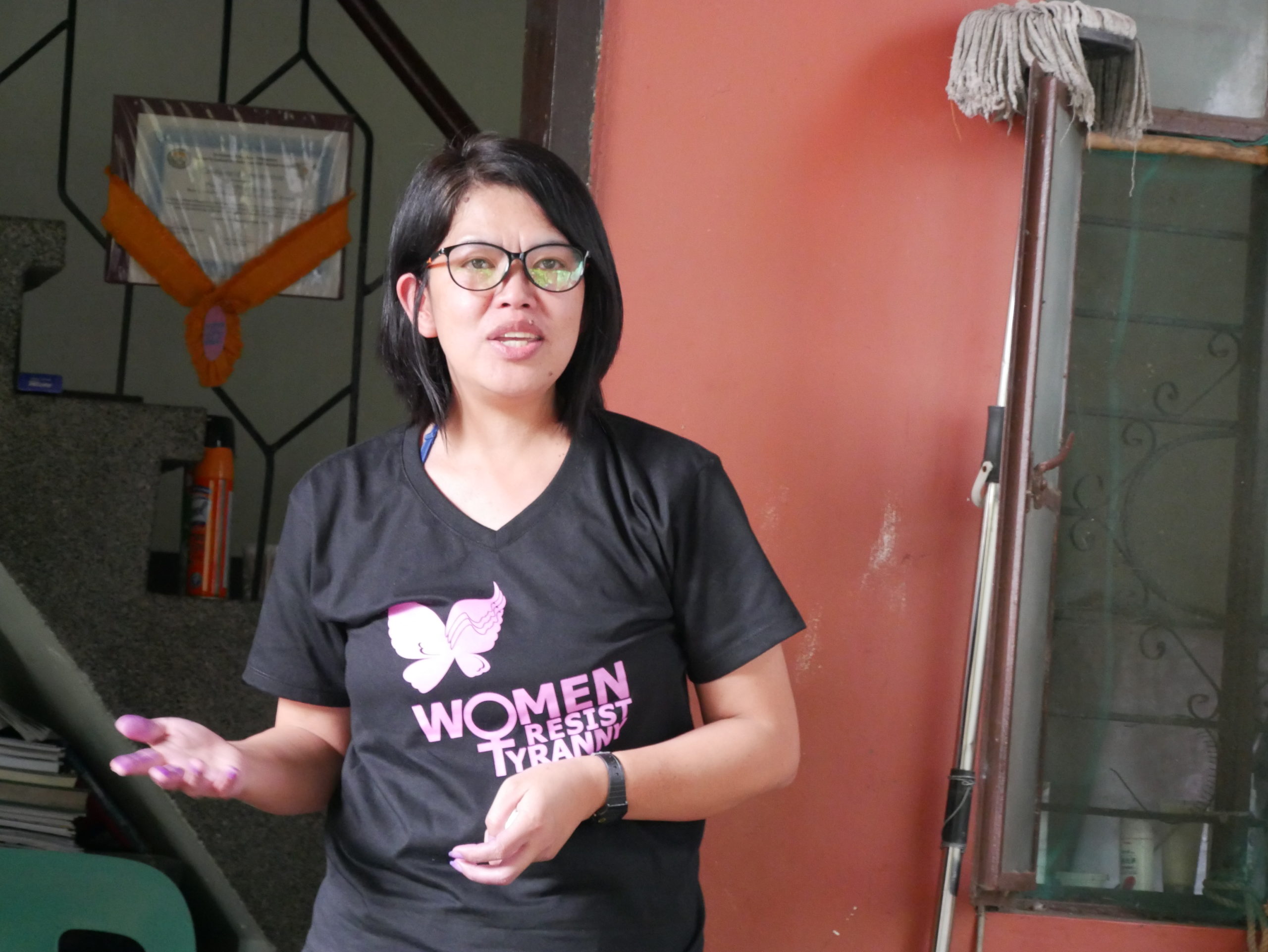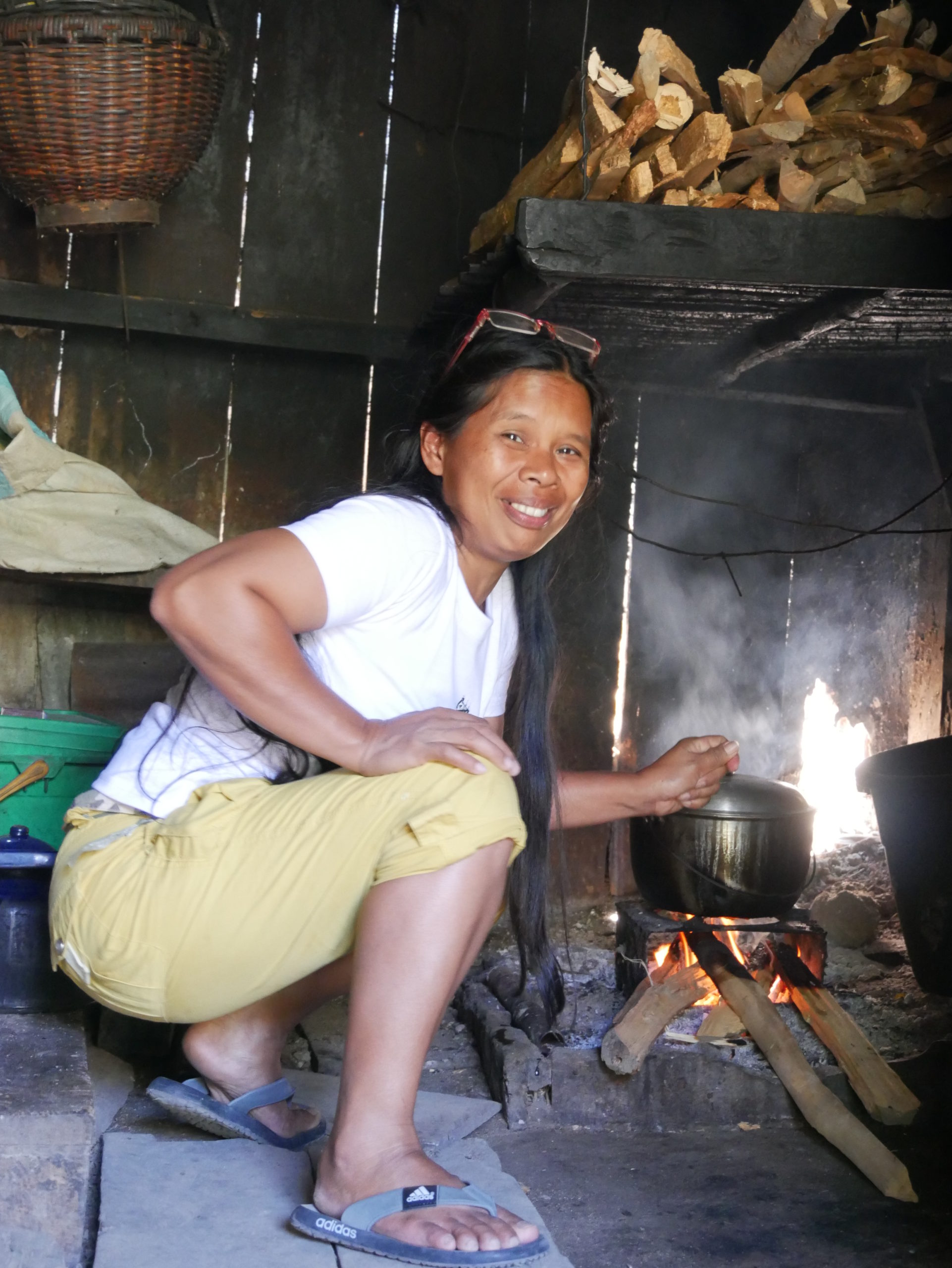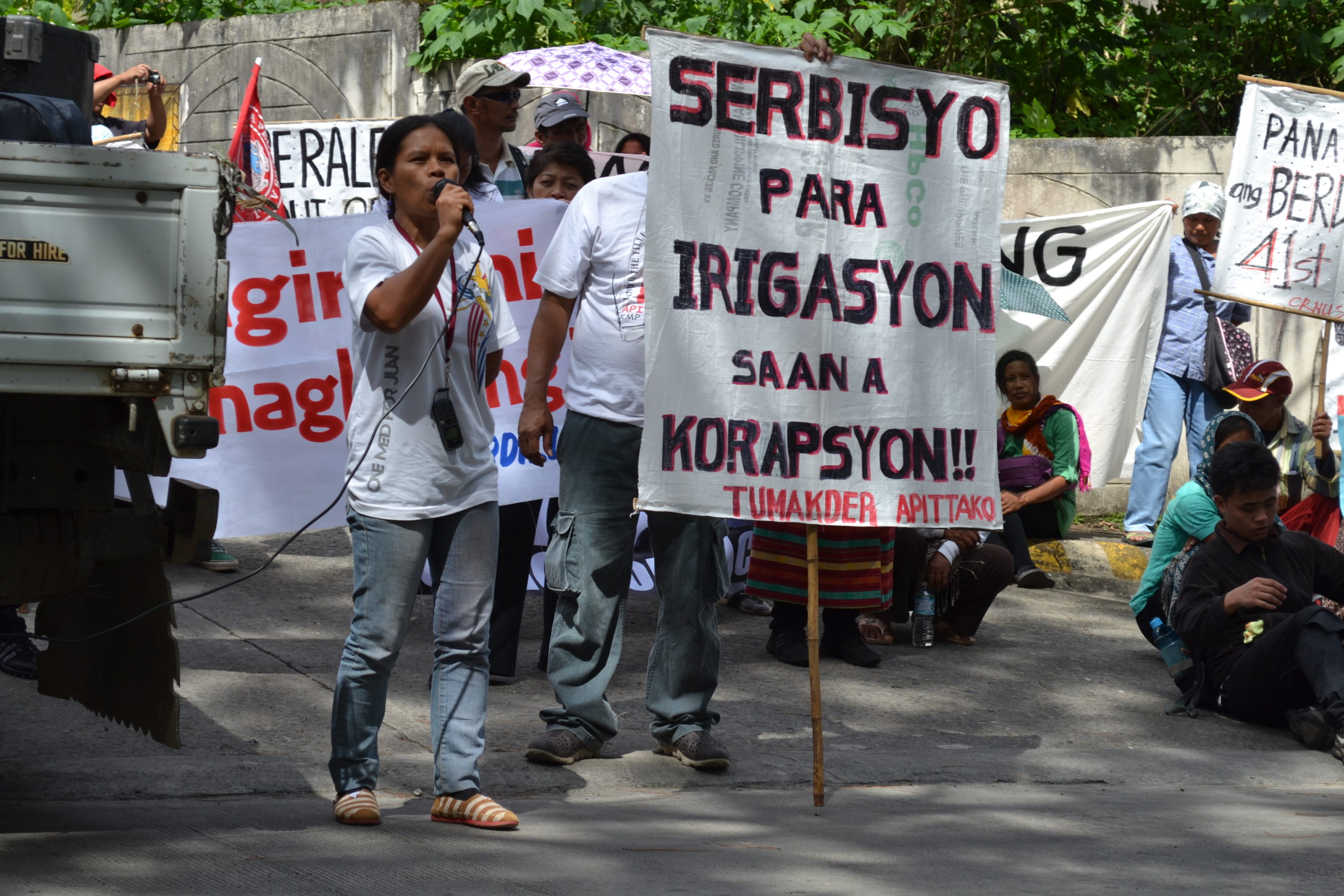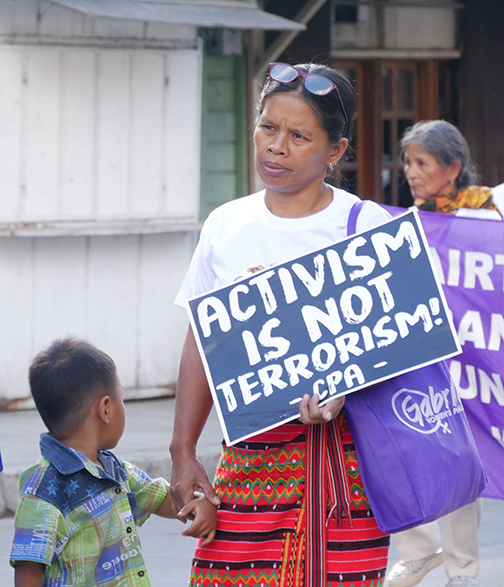Rachel Mariano and Betty Belen, indigenous women and human rights advocates share their incarceration stories due to trumped-up charges and evidence. The cause of their persecution is clear: they defend their ancestral lands. Because of their activities, their families and communities also suffer the impacts of prison. At present, both leaders have currently been released and continue to fight against the development projects of transnational companies in a context of escalating attacks against the indigenous peoples of the country.
Rachel Mariano is a member of the indigenous Ibaloi-Kankanaey people from the Benguet province. She is a community health worker who actively campaigns for people’s right to health. This people fiercely opposed large-scale open pit operations for many years, until the operations were halted. At present, their land remains threatened by other mining permit applications.

Photo: CWEARC, Inc.
Rachel was falsely accused of murder and attempted murder after a report presented by the 81st Infantry Battalion of the Armed Forces during an alleged encounter between the Armed Forces and the New People’s Army (NPA) in October, 2017. Two months later, Judge Mario Anacleto Báñez, who had ruled in favor of her acquittal, was murdered by unidentified men.
Moreover, Rachel was charged, along with four other women from the Cordillera, with two other counts of murder of the 14 that allegedly occurred in the south area of Ilocos, which is located in the northeast of the island of Luzon, the largest in the Philippines. Rachel and the other four activists were released on bail as the hearings continue during the pandemic.
Time spent in prison: depression, infirmary and organization
Rachel was incarcerated for 11 months and two weeks. The indigenous leader remembers this period with great sadness: “I was separated from my family and the communities that I wanted to serve. I suffered from depression since I could not accept being imprisoned for a crime I had not committed. My family and colleagues’ words of hope gave me the strength I needed to endure the pain while waiting to be released sooner or later. Prison visitations, which were expressions of solidarity and defiance from different communities, sectors and institutions, gave me the courage to continue fighting not only for myself but also for the less fortunate whose rights were being denied”.
In prison, she was considered a “high risk” inmate and, therefore, she was subject to more restrictions. To cope with the situation, Rachel practiced as a health worker: she took the blood pressure of her fellow inmates and advised them of the use of the herbal plants available in prison. Once, the resident doctor called Rachel’s attention and told her to stop acting as a nurse. “Keeping myself busy was my coping mechanism. It was therapeutic and it lifted my spirits”, said Rachel.
Through her work, Rachel gained the respect of her fellow inmates, who valued her commitment towards the right to health: “I started organizing them to reclaim their rights as women, such as being able to exercise using some of the exercise equipment. We were also able to assert that there was no reason for us to do our morning exercise in a place where our bodies were exposed. We were also able to settle petty conflicts among inmates”.
A typical day would include performing the tasks assigned: cleaning, caring for the garden, attending training programs, and assisting the guards in their routine. The seminars included food preservation, bonsai beads craftwork to be sold, organic farming, and first aid training.

Photo: CWEARC, Inc.
When the light shines the brightest
“My children were the most affected during my time in prison, particularly, my youngest daughter who was about to graduate. Since her father’s salary was not enough to afford the tuition and other school obligations, she was forced to stop studying. My other two children were also scared because of the uncertainty of the unfolding events. The eldest became the spokesperson of the family while my husband had to take care of the daily affairs both in prison and at home. They were very supportive of me”, explains Rachel.
The first thing Rachel wanted to do upon release was to reconnect with her loved ones, her community and colleagues from the Center for Development Programs in the Cordillera to thank them for their support. She also made sure to reach out to people who thought that the false charges were true.
At present, Rachel continues to work as a paralegal with the Cordillera Human Rights Alliance, where she is the spokesperson of Women Resist Tyranny campaign. “I have to continue with what I think now is a moral obligation: to help those who are also accused of trumped-up charges as much as I can. I have been there, and I know how it feels to be imprisoned.”
Last year, in a testimony among advocates of indigenous peoples’ rights, Rachel stressed the importance of defending human rights amidst a crisis: “It is said that we must shine our light the brightest in the darkest of times to forge greater and more meaningful solidarity when repression strikes”.
Betty’s story
Beatrice “Betty” Belen is an indigenous leader from Innabuyog, a grassroots women’s alliance in the Cordillera region. She comes from the Uma tribe of Lubuagan, and, like Rachel, she is a community health worker. Since Betty’s ancestral domain is affected by the geothermal project of Chevron, for a long time, she has been at the forefront of the local opposition to the project together with other women. For this, she has been harassed by the military.

Photo: CWEARC, Inc.
In October 25, 2020, Betty was arrested by a team from the Philippine National Police and the 503rd Brigade of the Armed Forces for alleged possession of three grenades. The evidence was planted. Neither Betty nor her family was inside the house when the search started at 4 o’clock in the morning.
The day she was arrested an indigenous ritual known as pusipos was supposed to take place. The ritual was planned for her father-in-law who was bedridden after being discharged from the hospital. “On October 26, my father-in-law was looking for me. He died on that same day at 8 p.m. My request to see him before his burial was denied. My family waited, but my request was denied,” she recalls. Betty had taken care of her father-in-law for a very long time.
Betty was initially held at the National Police detention facility in Tabuk City, in the same cell as the male detainees. Upon the actions of her lawyer from the National Union of People’s Lawyers, she was transferred to a separate detention space. However, she still had to share the common room and take turns to go to the bathroom. Later, she was transferred to the provincial prison where she was held for three months. Despite the difficulties, Betty encouraged the human rights defenders: “Don’t be discouraged. Grow in strength and number and don’t get tired of our job.”
Betty shared the cell with 13 other women. She was 50 years old, the oldest of the group: “I was quite well-known in prison. I was like an elder sister to them. I explained my work as a woman defender promoting women’s rights and protecting my ancestral lands. That is how they knew why I was in prison”. When the other inmates asked her why she had been charged with trumped-up charges instead of holding those who were liable, the indigenous leader answered that persecution would not silence her because if that happened, more poor people would suffer.
In prison, Betty busied herself with the gardening program. “This was the only time we would feel the fresh air. We grew and harvested a lot of pechay, which we even shared with the other cellmates. The vegetables we cultivated were important because they were the only source of fresh food”.
Their daily ration for the 13 inmates in her cell consisted mainly of 10 pieces of dried fish, two or three pieces of squash, two small tins of sardines, and rice: “The lard and sugar were rationed in the prison commissary”.
The impact of criminalization on family and the community
Due to the pandemic, face to face conversations were not allowed on visitation days. Betty explains the regulations became much stricter: “Only meals prepared by family members were allowed inside. Even if a family member brought you food on a visitation day, you could not talk. We could only wave at each other from afar.” Being away from her grandchildren was among the hardest circumstances she endured while incarcerated. Since the outbreak of COVID-19, Betty had been their teacher, guiding them in accomplishing their distance learning modules.
“It was painful for me to see them without their grandmother. I was very upset. Who would help them with their distance learning modules? They were denied a teacher and a grandmother for the four months I was incarcerated. I later learned that my grandchildren were not able to complete their studies properly. When I was released, someone told me my grandchildren were by the road, waiting for their grandmother to come home”. Once back, the leader said that the kids had lost weight and that they stuck to her all the time. Betty’s arrest also affected the family’s livelihood, which consisted of farming and mushroom production, a common source of income among the Uma tribe. After her arrest, her husband was not able to take care of the mushrooms or tend to the small family farm since he had to take on all the duties in the household.
As a community health worker, Betty raised awareness on proper hygiene, waste disposal, disease prevention; she also accompanied patients to their checkups in the provincial town center, and prepared herbal medicine. When talking to the women in her community, she emphasized the importance of taking care of one’s health and vaccinating children, as well as the need for regular tests and checkups, particularly in the case of the elderly.
“It did not matter that I did not earn any money. What mattered was that I was there to help and guide my community. While I was held, I could not conduct my usual house visitations. So, upon release, I tried to call some of them to ask them about their health. Some of them cried. They told me they felt like orphans”, Betty explains. Apart from spending time with her family, Betty wants to reach out to her kailian (her tribe and community) since she does not want them to be afraid or silenced because of what happened.

Photo: CWEARC, Inc.
Defenders are under attack
Rachel and Betty are only two of the many women human rights defenders who have been imprisoned in the Philippines. Even though they have been released, the long months of incarceration remain a grave injustice for them, their families and their communities. Their detention denied their families of a wife, a mother, an aunt, a sister and a grandmother. At the same time, their communities were denied of human rights activists who volunteered their skills and time.
The Center for Women’s Resources reported that, until February 2021, at least 20 women human rights defenders had been arrested. Some of them are indigenous women belonging to the Lumad, Aeta, and Tumandok indigenous groups. A report published in Bulatlat.com states that the arrested Tumandok men and women are “staunch defenders of their ancestral lands”. Among the women arrested are Tumandok leaders, Marevic Aguirre and Aileen Catamin. Moreover, the Aeta men and women were all charged with illegal possession of firearms and explosives, but only the men were charged with violating a provision of the Anti-Terrorism Act.

Photo: CWEARC, Inc.
In a public statement titled “Philippines: end attacks against indigenous peoples”, Amnesty International expressed being “deeply alarmed” by the series of escalating attacks against indigenous peoples. It calls on the Philippine government to launch prompt and impartial investigations into these attacks, and prosecute and bring to justice those found responsible in proceedings in line with human rights standards regarding due process: “It should also take concrete steps to ensure the protection, security and well-being of all Indigenous peoples, including those risking their lives to call attention to human rights violations in their communities and fight for Indigenous peoples’ rights.”
This statement also mentioned the case of the Cordillera activist, Windel Bolinget, who faces trumped-up charges of murder. Finally, Amnesty International also emphasized the raid at the University of San Carlos in Cebu leading to the arrest of seven individuals that include two datus – indigenous chieftains among the lumad –, two volunteer teachers and three adult students. They were charged with kidnapping and unlawful detention of lumad children. According to a report by Bulatlat.com, 19 students were taken into custody by police and social welfare custody.
As shown, the Philippine state has decided to move forwards in the persecution of indigenous peoples and defenders of human rights. Women became the target of the criminalization. The international community must be attentive and join forces to protect their rights.#
_____________________________________________________________________________________________
Abigail Bengwayan-Anongos is the Program Coordinator for Indigenous Knowledge Systems and Human Rights Research Support of the Cordillera Women’s Education, Action Research Center (CWEARC).
